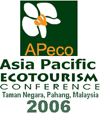 |
|
Mr Albert Teo, Managing Director, Sukau Rainforest Lodge
Definition of Ecotourism Ceballos-Lascurain, 1993 IUCN Ecotourism Program
Sukau Rainforest Lodge 1) Environmentally Responsible Travel 2) Nature Based including Culture 3) Ecologically sustainable and promotes conservation 4) Education and interpretation 4) Benefits the local community
Six Kinds of Capital Natural Capital – arable land, healthy soil, biodiversity. Infrastructure Capital – Road, water, sanitation, airport, telecom. Public Institutional Capital – law, judiciary, gov. services, policing, enforcement. Human Capital – Health, skills, nutrition. Business Capital – Machinery, facilities, equipment. Knowledge Capital – Science/Technology. * Reference: The End of Poverty by Jeffrey Sachs 2005
Some critical issues Personal and Team Experience. Initial Research and Planning. Expert Advice – architect, forestry & wildlife experts, local boatmen, fishermen, local knowledge. Local conditions – rainfall, temperature, humidity, flood, culture and religion, wildlife migration, public utilities. Technologies and back-up services. Human, Business and Knowledge capitals.
Sukau Rainforest Lodge Green Policies 1) Electricity and lighting – solar, hot water, oil lamp, fan, minimal energy consumption, generator. 2) Water usage – rainwater harvesting, river water, hot water system, minimal water consumption. 3) Disposal of waste – septic tanks, cooking oil, used diesel and recycling bins. 4) Noise – open lounge concept, no TV, radio, no air-condition, acoustic generator, electric motor. 5) Safety and Cleanliness – no eating in room, CCTV, walkie talkie, CB radio, fire extinguishers, life jackets on boats. 6) Design and construction – away from river, on stilts, open concept, minimal footprint. 7) Local community participation – employment, language and skills training. 8. Community and 8) Environment projects – SERDC/ BEST; guest donation and SRL allocation of USD1 per international guest; BET allocation. 9) Education and interpretation – nature education centre, booklets, in-room files, room and bathroom information, slide show and guided walks. 10) History Water Harvesting & Heating Facilities Hornbill Boardwalk 1) Education and interpretation of the rainforest. (booklet) 2) Safety from falling branches and all weather use. 3) Minimal impact on wildlife migration and vegetation. 4) Open deck for wildlife viewing and privacy.
Melapi Restaurant
Guiding Principles 1) Confirmation of Building Location
2) Zoning Plan 3) Design Concept Proposal
4) Proposal for Material Use 5) Design Images
|
 Designing,
Building and Maintaining Ecotourism Facilities" Sukau Rainforest
Lodge
Designing,
Building and Maintaining Ecotourism Facilities" Sukau Rainforest
Lodge